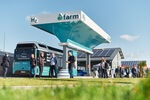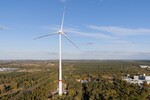Blade manufacturers announce joint commitment to support recycling by providing material passports
Today, there is a market for recycling most of a wind turbine, but there has not been a market for the composite that makes up the blades.
The DecomBlades innovation project addresses this with a new blade material passport, making it easier to dismantle and recycle the blades.
The material passports were developed by mapping out the composition of the blades of three major blade manufacturers: Siemens Gamesa, LM Wind Power, and Vestas, all involved in the DecomBlades innovation project. Other companies, including Nordex Group, Enercon and GE Vernova, are planning to join this initiative aimed at implementing standardized material passports in the wind industry.
Once mapped, the data has formed the basis for a standardized recommendation for blade material passports, which includes what materials are used in the blades and where they are situated. This makes it is easier for recycling companies to separate the blades and recycle the parts.
John Korsgaard, Sr. Director Engineering Excellence and Chair of the DecomBlades Steering Committee, explains:
“The wind industry strongly supports the development of viable value chains for recycling blades. With the commitment to provide blade material passports, we hope to accelerate the establishment of a viable market for recycling blades. The information in the blade material passport will be valuable for blade recycling companies and will help them enhance their process efficiency. We need to work together to industrialize the blade recycling sector, enabling 100% blade recycling in the future,” said John Korsgaard, Senior Director, Advanced Technology Development and Chief Engineering at LM Wind Power and Chair of DecomBlades Consortium.
Committing to provide a service for legacy products
The European wind power industry has called for a landfill ban on blades in Europe by 2025. To support implementation of the landfill ban, a group of major blade manufacturers have voluntarily committed to provide a material passport as a service for their products.
These material passports will be available on the company websites for representative blade models within each MW category that are nearing their expected decommissioning date. These material passports will be representative for many blades that are built in the same way but come in different sizes.
The companies committing to this service will use recommended content from the DecomBlades material passport to provide recycling companies with a concise, clear, and recognizable format for receiving information about blade materials that supports recycling.
Examples of material passports from LM Wind Power, Vestas, and Siemens Gamesa can be downloaded at www.decomblades.dk. The fully public content is free for anyone to use.
Sophus Borch, Business Development Manager at HJHansen Recycling, one of the partners in the DecomBlades project, states:
“The complex composition of a Wind Turbine Blade makes it very hard to recycle and also very hard to know how to do the pre-processing and further processing of the blade efficiently.
The Blade Material Passport makes this a lot easier. When working on-site we do not need the extremely complex descriptions of the blades, but a simple tool that tells us the dimensions and where we can find the different elements. This means we can speed up our processes at a glance. The Blade Material Passport supports this exact thinking.
Calling for a standard for future products
Beyond the 2025 landfill ban on blades in Europe, blade manufacturers aim to continue to support efficient recycling of future products. Therefore, blade manufacturers are calling for the DecomBlades material passport content to be described in a standard.
This blade material passport would be provided by wind turbine manufacturers to wind power plant developers during the permitting process along with other product documentation, as is current practice.
When the wind turbine nears its end-of-life after 20 years or more, the material passport would be provided by the wind power plant owner to the company handling its decommissioning and recycling. Blade manufacturers can also continue to publish representative material passports on their websites as products near their end-of-life to make these documents easily available to recyclers.
About DecomBlades
The DecomBlades project is partially funded by Innovation Fond Denmark and is a collaboration between MAKEEN Energy, LM Wind Power, Siemens Gamesa, Vestas Wind Systems A/S, Ørsted, Technical University of Denmark (DTU Wind and Energy Systems), University of Southern Denmark (SDU), HJHansen Recycling, FLSmidth, and Energy Cluster Denmark.
More information about the project can be found at www.decomblades.dk
- Source:
- Energy Cluster Denmark
- Author:
- Press Office
- Link:
- www.decomblades.dk/...
- Keywords:
- DecomBlades, rotor blade, recycling, partner, manufacturer, commitment, material passport, innovation, cost effient, document, standard, industry

























